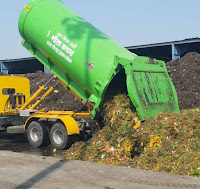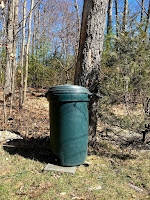The Quarantined Leaves
Every time I returned from visiting my family in Toronto, Canada or Indore, India, I was all pumped up about doing more for the environment. In both these places I am reminded of the importance of separating wet and dry, recyclable waste. Rotting of food or organic wet waste in landfills is the third largest source of methane emissions in the United States. Half of the landfill gas is methane. Methane is a potent greenhouse gas that causes way more harm to the environment than carbon dioxide. And there is a simple way each of us can contribute - by composting our food waste, so it doesn’t end up in landfills, generating tons of methane.
 I had experienced the Canadian system tens of years ago. Though Indore is a recent star. Only five-six years ago one could see heaps of trash at road sides all over the city. There was no trash collection system from homes, let alone recycling or composting plants. In the past few years there has been consistent, exponential growth in building infrastructure and platforms to support every kind of waste management system in Indore. Their recent addition is the bio-methanation plant for the wholesale vegetable and fruit market, which generates enough Bio-CNG gas to run 15 city buses. The citizens of Indore take pride in the city’s development and have supported all initiatives whole-heartedly. Indore has inspired me in doing more for the environment and I am constantly trying to find ways to pitch in more.
I had experienced the Canadian system tens of years ago. Though Indore is a recent star. Only five-six years ago one could see heaps of trash at road sides all over the city. There was no trash collection system from homes, let alone recycling or composting plants. In the past few years there has been consistent, exponential growth in building infrastructure and platforms to support every kind of waste management system in Indore. Their recent addition is the bio-methanation plant for the wholesale vegetable and fruit market, which generates enough Bio-CNG gas to run 15 city buses. The citizens of Indore take pride in the city’s development and have supported all initiatives whole-heartedly. Indore has inspired me in doing more for the environment and I am constantly trying to find ways to pitch in more. With nowhere to go during the pandemic lockdown, we were looking to do projects around the house. Setting up a composting system was the perfect project we had been meaning to do all these days. Many people in our community had already taken the initiative and we had learned from them about their systems. After a little bit more research, we decided to build our compost using an old trash bin. The bin needed some holes at the bottom so the compost could breathe, and line the base with some straw. The bin needed a place in the backyard where it could get some sunlight. It needed a system of aeration.
With nowhere to go during the pandemic lockdown, we were looking to do projects around the house. Setting up a composting system was the perfect project we had been meaning to do all these days. Many people in our community had already taken the initiative and we had learned from them about their systems. After a little bit more research, we decided to build our compost using an old trash bin. The bin needed some holes at the bottom so the compost could breathe, and line the base with some straw. The bin needed a place in the backyard where it could get some sunlight. It needed a system of aeration.  Once the bin was set up, the compost needed browns and greens. Browns are dry leaves, twigs, wood chips, cardboard, clipped newspaper etc - materials that are carbon rich. Greens are the food waste from the kitchen such as vegetable scraps, fruit rinds or peels, coffee grounds or filters, tea leaves, flowers, even grass clippings - materials that are nitrogen rich. For the best compost the browns and greens go in a 3:1 ratio, and mixed well with some water. Once we created the starter compost, and set up a wet bin in the kitchen to collect food waste, our job for the day was done. Now on a regular basis our food waste ends up in the bin. Every few days, we check the balance between the greens, browns and water and turn the compost around. We are expecting that by the beginning of summer our compost would be ready for consumption in our garden. It was an easy enough project, with much to gain!
Once the bin was set up, the compost needed browns and greens. Browns are dry leaves, twigs, wood chips, cardboard, clipped newspaper etc - materials that are carbon rich. Greens are the food waste from the kitchen such as vegetable scraps, fruit rinds or peels, coffee grounds or filters, tea leaves, flowers, even grass clippings - materials that are nitrogen rich. For the best compost the browns and greens go in a 3:1 ratio, and mixed well with some water. Once we created the starter compost, and set up a wet bin in the kitchen to collect food waste, our job for the day was done. Now on a regular basis our food waste ends up in the bin. Every few days, we check the balance between the greens, browns and water and turn the compost around. We are expecting that by the beginning of summer our compost would be ready for consumption in our garden. It was an easy enough project, with much to gain!
April 22 is Earth Day. Our compost bin, with its quarantined leaves and food waste, is a token of gratitude on the 50th Anniversary of Earth Day.
Indore Image credit : https://www.smartcityindore.org/solid-waste/
There is a high tech alternative to the natural compost - http://www.smartcaraeurope.com/
There is a high tech alternative to the natural compost - http://www.smartcaraeurope.com/









Great initiative!! Keep it up!!
ReplyDelete